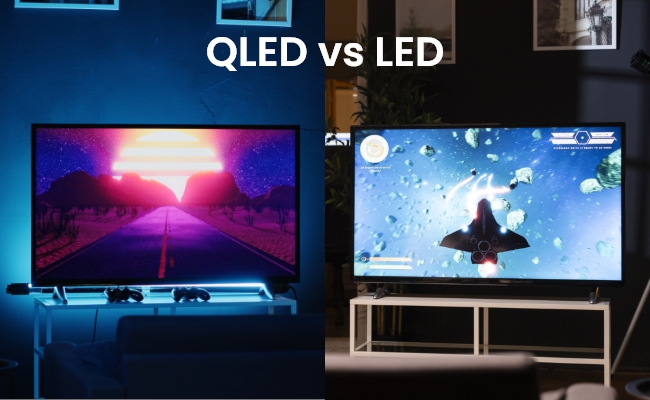QLED vs LED TV: Comparison Between Them

When shopping for a new television, you might hear the terms LED, OLED, and QLED, but it’s hard to know what these terms mean and what to choose. So, let’s split the differences between QLED vs LED vs OLED. By the end of this guide, you will have a better understanding of these types of TVs. Moreover, you will be able to select the best one for yourself.
Note: Don’t miss Reolink Deals for exclusive discounts on security cameras!
Reolink Security Camera Sale - Secure Your Home with Huge Savings!
Save big with Reolink! Special deals on security cameras, doorbells, and systems.
LED vs QLED: Basic of LED TV
Let us begin with the basics of what is LED and what is LED TV.
What is LED?
This term comes from Light light-emitting diode or LED. The process is to power these small, fragmented light sources which then emit light. They’re used broadly in electronics, such as in indicator lights on small gadgets, the backlighting on some TVs, and in the displays of curved TVs.
What is LED TV?
An LED TV is just a type of television where the backlight is sourced using LEDs. Images we see on the screen are produced by the images formed by this backlight shining through an LCD panel. It depends on the LCD layer for controlling color and image quality. These make a great option if you’re looking for a less expensive TV, LED TVs are also thinner and less energy-hungry than older LCD TVs.
LED vs QLED: Basic of QLED TV
Now, let us move on to the details of what is QLED and what is QLED TV.
What is QLED?
Quantum Dot LED, or QLED, is a display technology that uses quantum dots, tiny parts that emit specific colors when light touches them, to improve the LED of a TV.
What is QLED TV?
Quantum dots are combined with LED backlighting to create a higher brightness and richer color picture than a regular LED TV, delivering a more vivid, true-to-life picture. QLED TVs are the right choice for bright rooms and viewers who want all their colors to be vibrant.
LED vs QLED TV: What's the Difference?
Both LCD-based TVs, LED and QLED are different in how they boost picture quality, color, and brightness. Instead, a Samsung QLED is a Quantum Dot LED; and is a technology that broadcasts colors and brightness beyond the borders of traditional LED TVs.
Picture Quality
While quantum dots can be used in almost every LED display technology, QLED TVs fully use them. Quantum dots are what allow QLED TVs to come up with more colors, in some cases, making the image look more vivid and precise compared to regular LED TVs.
QLEDs get better depth and range than LED TVs do. Viewers who want a bit more lifelike images will like QLED’s color enhancements.
Contrast and black levels in various lighting conditions
True black levels are usually the weakness of LED TVs. Since these screens rely on an LED backlight, there’s no way to fully shut off light in certain screen areas. This can have serious consequences in darker scenes, especially when this can lead to a 'washed out' effect.
QLED TVs do provide a small bit of improvement here, particularly when paired with technologies such as 'local dimming' where only parts of the backlight are on or off based on the scene. OLED technology also has some limitations when compared to QLED and LED TVs but can backlight individual pixels for deeper blacks.
Brightness
The quantum dot layer contributes part of the brightness of QLED TVs, but these TVs normally deliver higher brightness levels than standard LED TVs. QLEDs are better for well-lit rooms, where greater brightness is necessary to help maintain clarity and vivid colors in sunlight. QLEDs can get good brightness, like standard LED TVs, but may not be as good as they are in very bright settings.
Viewing Angles
Typically, it is very hard for LED and QLED TVs to maintain color accuracy and brightness from extreme side angles. If you watch either of these from any angle, then the colors may fade or start to distort. Still, QLED TVs are usually better on side angles than regular LED models, but neither are as good as the excellent side angles of OLED TVs.
Energy Efficiency
All LED and QLED TVs are energy efficient and there won’t be a huge difference in energy usage based on the brightness settings. If you are buying QLED TVs at a high brightness, they will consume a little more power than a regular LED TV. Nevertheless, both types tend to perform well energetically compared to previous television technologies.
Durability and Lifespan
LED and QLED TVs are durable and come with long lifespans of 50,000 and 100,000 hours respectively. Unlike OLED TVs, which can experience burn-in (the problem of static images permanently imaging themselves on the screen), QLED TVs boast an extra quantum dot layer that doesn’t suffer the same issue. The durability of both LED and QLED TVs makes them great long-term TVs.
LED vs QLED vs OLED TV: What's the Difference?
Since LED TVs and QLED TVs use LCD technology with LEDs, nothing they have on the body is their fault, except maybe heavy design, but branded OLED is quite different.
What is an OLED TV?
OLED is a technology that uses organic compounds that emit visible light when an electric current passes through. While an OLED TV might have more pixels than your computer monitor, each pixel is capable of self-illuminating so it can turn on or off.
Because it is the self-emissive nature of OLEDs gives OLEDs an advantage to exhibit true blacks, contrast, and wide viewing angles.
Comparison Table
FAQs
1. Is QLED really better than LED?
QLED really does improve the color vibrancy, brightness, and, to a limited degree, the contrast of the TV compared to traditional LED TVs. Adding quantum dots into the QLEDs expands the spectral range increases the brightness and makes QLEDs suitable for areas with much ambient light.
2. Is a QLED TV worth the extra money?
Typically, QLED TVs are more expensive than regular LED TVs; however, they excel in their performance of color, brightness, and sometimes contrast. If it’s important to you to have vivid colors on your TV, then if you’re watching it in a bright room the investment could be worthwhile with a QLED.
3. What is the drawback of QLED?
QLED displays rely on LED backlighting, which limits their ability to achieve true blacks, resulting in less immersive dark scenes compared to OLED. Viewing angles are also a concern, as color accuracy and contrast can diminish when viewed from the side. Additionally, QLED panels consume more power due to their backlight system and are typically thicker than OLED screens, restricting ultra-slim designs.
4. Which is better 4K or QLED?
4K and QLED refer to different aspects of display technology, so one isn’t inherently "better" than the other—they serve different purposes.
Conclusion
When comparing QLED vs. LED TVs, the right choice depends on your viewing needs and budget. Both QLED and LED TVs offer excellent viewing experiences. You can consider your space, viewing habits, and budget to determine which technology best suits your needs.
Search
Subscribe for the Latest Updates
Security insights & offers right into your inbox

